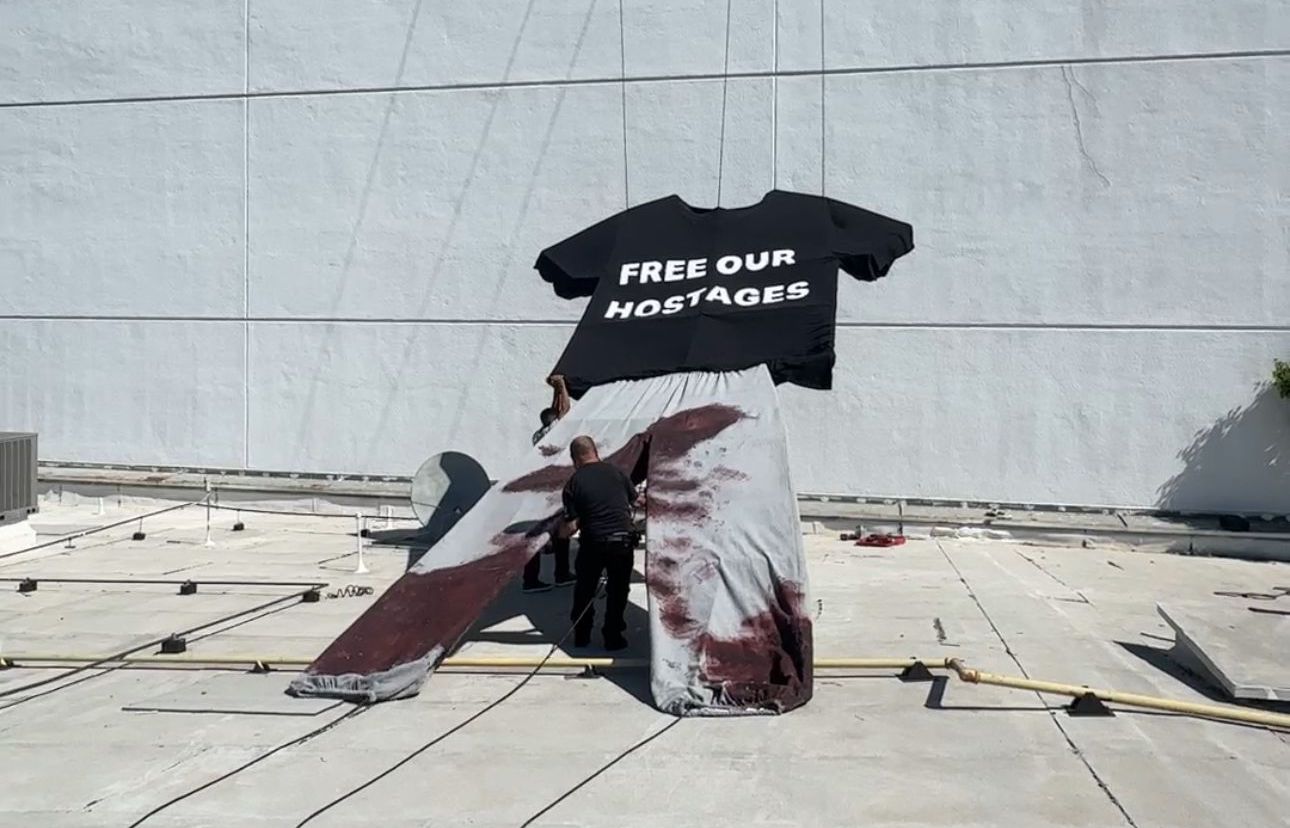Tel Aviv’s ‘Hostage Square’ is coming to Chicago for the DNC — with or without a permit
The installation will feature 10-foot-tall milk cartons with the faces of the eight Americans still captive in Gaza

Artist Tomer Peretz works on an installation planned for a Hostages Square replica near the Democratic National Convention. (Michael Cannon)
(JTA) — Pro-Israel activists will mount a “Hostage Square” during the Democratic National Convention in Chicago next week, in a bid to spotlight the plight of Israeli captives at a time when the city is preparing for large pro-Palestinian demonstrations.
The public art installation, organized by the Israeli American Council, will be held on a private lot and does not need require a permit, a spokesperson told JTA. They have not disclosed the exhibit’s intended location, though they say it will be close to the convention, which will be held at the city’s United Center.
“Hostage Square Chicago will be a place where all Americans, especially Jewish Americans, can express solidarity and prayer for our hostages who still remain in Hamas hell, condemn the savage massacre of October 7, and pray for Israel’s victory over her genocidal enemies,” IAC CEO Elan Carr said in a statement. “It will also be a place where we can dwell with pride over America’s strong support of the Jewish people and the State of Israel.”
The installation is set to include six large pieces by Israeli artists related to the Oct. 7 attacks, in addition to eight milk cartons each standing 10 feet tall that echo campaigns in the 1990s to publicize missing children. The cartons will feature blown-up images of the Israeli hostage posters that wallpapered major cities early in the war, with each bearing the name and photo of an American still held captive in Gaza.
Eight Americans are still held hostage; three of them are known to be dead. They include Hersh Goldberg-Polin, 23, whose parents have emerged as a prominent face of the advocacy effort to bring the hostages home.
One of the installations at the planned hostage exhibit, created by the Los Angeles-based artist Tomer Peretz, will include a massive T-shirt that reads “Free our Hostages,” accompanied by a pair of blood-stained sweatpants, reminiscent of a graphic image of a woman kidnapped by Hamas on Oct. 7.
The installation and its name are meant to evoke Hostage Square, an area outside the Tel Aviv Museum of Art that has become an epicenter of advocacy around the hostage crisis. The area showcases constantly evolving public art installations meant to draw attention to the plight of the hostages, and also features an empty Shabbat table, with each chair representing a hostage still being held in Gaza. That installation was replicated in New York’s Times Square and other locations.
Hostage Square has also become a gathering place for relatives and supporters of the hostages, and for actions in support of a ceasefire deal for their release.
Art installations in other cities around the world — including giant milk cartons — have also sought to draw attention to the hostages’ plight.
IAC says it has had trouble acquiring permits to demonstrate outside of the convention. The Department of Transportation offered an alternate location three blocks away that the IAC rejected because it said the space was too far away from the site of the convention, Jewish Insider reported.
Pro-Palestinian groups have secured permits for large marches on the first, third and last day of the convention. The marches are slated to start at a park a few blocks away and head to the area of the United Center.
Family members of an American hostage in Gaza, Omer Neutra, spoke at the Republican National Convention last month. The New York Times reported this week that family members of hostages had been invited to speak at the DNC but no plans have been announced.
A message from our CEO & publisher Rachel Fishman Feddersen
I hope you appreciated this article. Before you go, I’d like to ask you to please support the Forward’s award-winning, nonprofit journalism during this critical time.
We’ve set a goal to raise $260,000 by December 31. That’s an ambitious goal, but one that will give us the resources we need to invest in the high quality news, opinion, analysis and cultural coverage that isn’t available anywhere else.
If you feel inspired to make an impact, now is the time to give something back. Join us as a member at your most generous level.
— Rachel Fishman Feddersen, Publisher and CEO